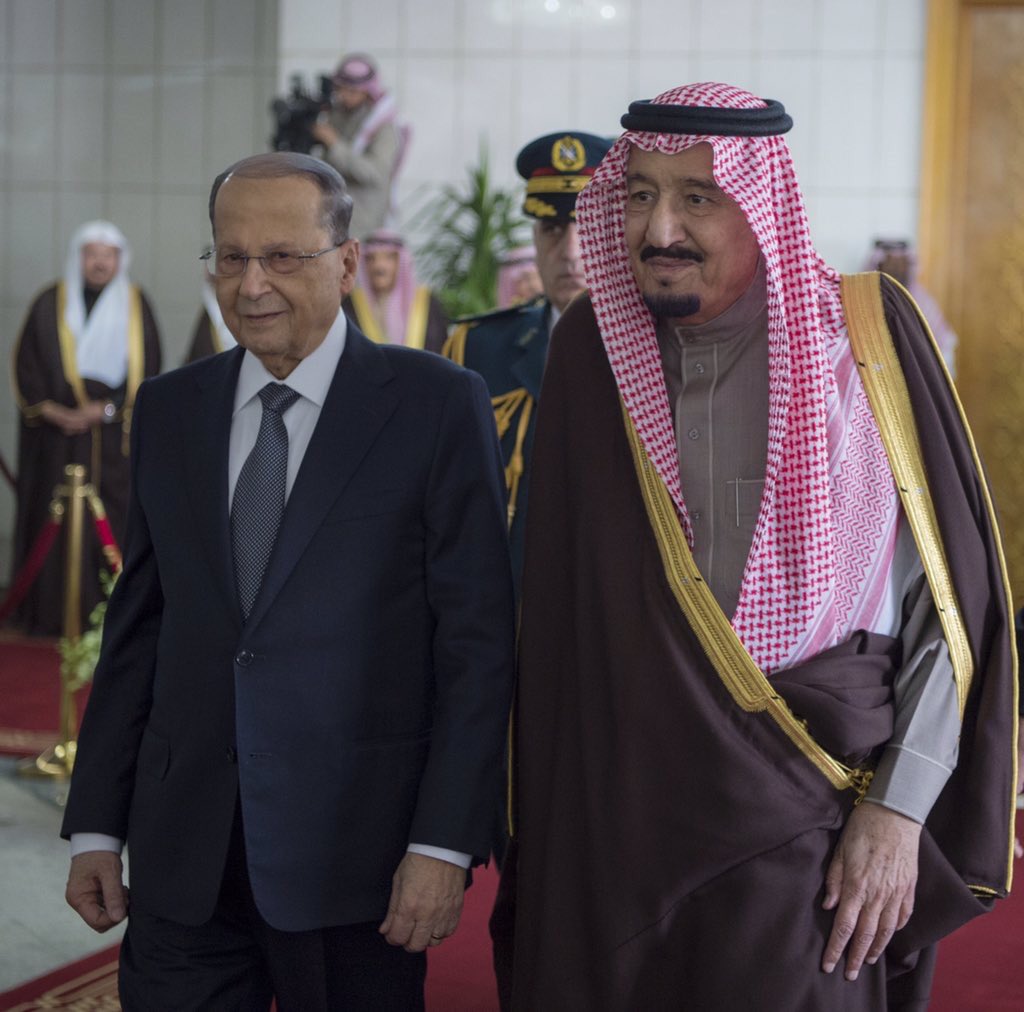Aoun needs to mend fences with the Gulf
Michael Young/The National/January 12/17
Michel Aoun, Lebanon’s president, began his first foreign visit on Monday. It was no coincidence that he flew to Saudi Arabia.
That may sound counter-intuitive, since Mr Aoun, mainly because of his close alliance with the pro-Iranian Hizbollah, has long been regarded as hostile to the kingdom. Nor have the Saudis been enthusiastic about the idea of an Aoun presidency, regarding him as the candidate of Iran and its allies.
However, such views fail to take into consideration that once Mr Aoun fulfilled his ambition of being elected, he needed to recentre his presidency in such a way as to reflect a Lebanese consensus and satisfy Lebanon’s Sunnis as he had done the Shia. There were also more prosaic reasons for the president to reconcile with the Saudis, not least that Lebanon cannot afford to alienate the Gulf states.
The relationship between Lebanon and the Gulf has deteriorated sharply.
Early last year, the Saudis announced that they would suspend $4 billion (Dh14.7bn) in aid to the Lebanese army and security forces. This followed the refusal of Lebanon’s foreign minister, Gebran Bassil, Mr Aoun’s son-in-law, to condemn attacks against Saudi diplomatic missions in Iran following the execution by the kingdom of a Shia cleric. More generally, the Saudis were said to be displeased with the fact that opposition to Hizbollah in Lebanon was not strong enough. Some Lebanese were expelled from the Gulf for their alleged ties to the party, and Gulf countries continued to discourage citizens from travelling to Lebanon – a significant blow given the country’s economic difficulties and the fact that Gulf tourists are a major driver of the tourism sector.
The Saudis were flexing their muscles and reminding the Lebanese that they could not survive long by falling entirely into the Iranian sphere of interest. Of particular worry in Beirut was that the Saudis would withdraw $1bn they had placed with Lebanon’s central bank. While the economic impact would have been small, by coming on the tails of the Saudi National Commercial Bank’s decision to close its branches in Lebanon, it would have been a blow to confidence in the economy.
Confidence is what keeps Lebanon economically afloat.
The country’s financial backbone is its banking sector and Mr Aoun’s visit to Saudi Arabia is in part recognition of the importance of the Gulf states in ensuring that financial stability continues. That said, before Mr Aoun left for Riyadh, there was little clarity about what he hoped to achieve other than to rebuild ties.
The reason for this ambiguity is that the Saudis themselves continue to have doubts about Mr Aoun. Proof of this was that little was said in Riyadh about reversing the decision not to finance the army. The president’s decade-long political relationship with Hizbollah, often directed against a prime Saudi ally in Lebanon, Saad Hariri, is not something they will quickly forget. But the Saudi invitation for Mr Aoun to visit the kingdom was a way of showing they were keeping an open mind.
The Saudis themselves are also taking a different tack with regard to Mr Hariri, who has returned as Lebanon’s prime minister. Mr Aoun’s election was secured when Mr Hariri ordered his parliamentary bloc to vote for him. Many believe Mr Hariri imposed his decision on a wary kingdom, a move facilitated by the Saudis’ leaving Mr Hariri in the lurch financially in the past year, amid allegations they were unhappy with his performance.
The Saudi decision to receive Mr Aoun was recognition of its willingness to endorse Mr Hariri’s support for the new president, even if it has yet to resolve the serious difficulties faced by Mr Hariri’s Saudi Oger contracting company in the kingdom. But it’s also likely that the decision to deal differently with Mr Hariri, and no longer make him the focal point of Saudi Arabia’s Lebanon policy, eased the new approach to Mr Aoun.
While the kingdom may look differently at Lebanon from a year ago, there are no certainties and the situation may be reversed. The Saudis will be watching closely at how Mr Aoun deals with Syria, for example, and whether he meets president Bashar Al Assad. It will also be keeping a close eye on Lebanon’s contacts with Iran, with Iranian officials visiting Beirut on a regular basis. Lebanon will continue to try walking a tightrope in the region, with a wary eye on the Gulf states.
But what the Saudis can see, as can the Lebanese, is that it’s difficult to veto anyone in regional diplomacy. Isolating Iran is no more possible than is isolating Saudi Arabia and the Gulf states. For most countries, dealing with both sides of the Saudi-Iranian regional divide is a necessity. The outcome of Mr Aoun’s visit to Saudi Arabia will reveal if Lebanon’s delicate balancing act remains viable. By travelling to the kingdom first, the Lebanese president showed that he thought it was.
*Michael Young is a writer and editor in Beirut
On Twitter: @BeirutCalling






















